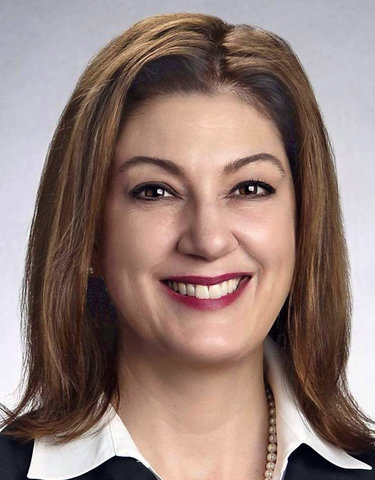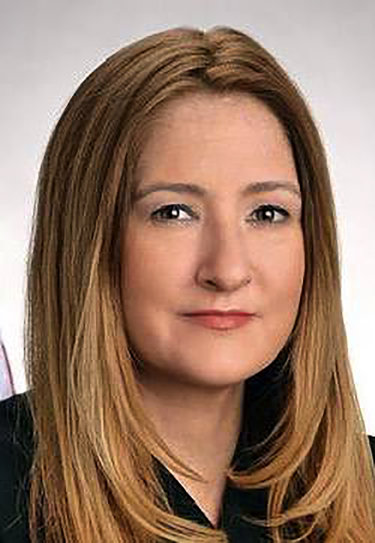City judges face off in Democratic primary for county court
ALBANY COUNTY — Two city judges — one from Cohoes and one from Albany — are running on their records for Albany County Court Judge in the June 25 Democratic primary.
Holly Trexler says that she would continue her philosophy of restorative justice that she has followed while working on both sides of the legal system.
Andra Ackerman has established a mentoring program for at-risk teenagers that she wants to bring to the county level.
The seat was vacated by Peter Lynch who moved to State Supreme Court.
Andra Ackerman
Andra Ackerman, 47, said that she saw herself in some of the young defendants who came before her when she started as a Cohoes City Court judge in 2016. Growing up in the foster-care system and living in several different homes as a child, she said what made it different for her was having mentors and role models to guide her.
So she founded the United Against Crime Community Action Network, or U-CAN, in which defendants can plead to a misdemeanor and participate in a year-long program, after which the charges are adjourned in contemplation of dismissal if they successfully complete the program. That means if the defendants stay clean, their records are sealed.
“Somebody saying, ‘Hey, I was in foster care,’ — that’s not the reason to vote for somebody,” said Ackerman. “What I care about is that people see what I’ve done with that.”
She said her experience helps her understand her defendants and the need for structure and support. She saw them having a similar upbringing to herself but they were lacking role models, while she had people like guidance counselors supporting her in middle school and high school.
In the U-CAN program, the participants must meet regularly with probation officers and mentors and be drug-tested. They have to get a part-time job and also work on getting a high-school diploma or equivalent if they don’t have a diploma.
Ackerman says it is a “tough love” approach because failing to complete the program could mean jail time.
“But the important part is they always know that’s a consequence for the behavior, that they are not bad people … ,” she said. “Because many of them just don’t understand the difference and shame themselves.”
After the state’s Raise the Age Act was passed, the 16-year-olds who would be part of the U-CAN program are no longer eligible because they are now being tried in Family Court; starting in October, 17-year-olds will also be phased in. Ackerman said that she now hopes to continue the program with those age 18 and up. She also hopes to have the program be used in Albany County Court should she be elected.
“There are a number of non-violent, young defendants — you know, we’re talking 18- to 26-years-olds — that are trapped within themselves and in the courts in the criminal-justice system that I think would be very appropriate for a program just like this,” she said.
Ackerman said she lived in many different places growing up. She moved to Cohoes when she was 18 and lived there until she went to law school, after which she returned to Cohoes and has lived there since. The community in Cohoes and Albany County has been integral to the U-CAN program, she said, by providing mentors and job opportunities for the participants.
New state laws will change criminal-justice proceedings, such as by eliminating bail in most cases, and requiring prosecutors to make evidence available to the defense earlier.
“I think society is saying we need to do more … and it’s happening, I think we’re definitely heading in the right direction,” Ackerman said.
She said her philosophy as a judge is dedicated to compassion and an obligation to try to solve problems in a community.
“I think we can be strong judges, but be compassionate, at the same time … ,” she said.
Holly Trexler
Before Holly Trexler, 47, was elected to Albany City Court, she worked as an attorney for 20 years.
The first eight were as a special victims unit prosecutor where she worked on cases involving homicides, domestic abuse, serial rapists, elder abuse, and animal abuse, she said. For the next 12 years, she served as a criminal defense attorney because, she said, she wanted to work on both sides of the criminal-justice system.
“I wanted to go sit down at the jail and talk to someone who had been arrested … ,” she said. “I wanted to sit down and talk with people’s families and understand how things like incarceration, or even mass incarceration as a whole, affect families.”
Trexler became a judge in 2017, and now handles all criminal cases in Albany as well as jury trials. With years of working in the courts, she said she had ideas in mind to better the city court. She noticed issues like long wait times for people waiting for their cases to be heard and defendants being arrested for the same thing over and over.
“Although we are not social workers, as lawyers or as judges, it’s important to take a look at what the underlying problems are,” she said.
Trexler said that, for example, if someone repeatedly is tried for drug possession, he or she might have a drug problem and that should be addressed.
Trexler also said that Albany has had a homelessness problem that needed to be addressed in the courts. So she worked with local organizations that help the homeless and with politicians to hire an advocate for the homeless to be in the court part of the week. A representative from the county’s mental health department was also brought in, and bringing in a dual-language substance-abuse counselor is also in the works.
Trexler believes that these programs and ideas would translate well to county court.
Trexler is also running on her record as a judge. Currently, judges must not have more than 25-percent of their cases in court longer than the imposed time limits. Trexler said only 7-percent of her cases have gone on longer than the time limit.
“ … People would languish in the county jail; people would not have a trial in a timely manner,” said Trexler. “That doesn’t happen anymore.”
Trexler believes she would be a benefit to county court by ensuring statutory timelines are adhered to. The state’s newly enacted bail guidelines will be able to move the process along as well, she said, because a person accused of a crime will be able to meet with his or her lawyer at home or in an office rather than in jail.
“The new legislation is how I have always done business either as a prosecutor or a defense attorney,” she said, adding that she always turned over discoverable material as a prosecutor right away and as a defense attorney put pressure on prosecutors to release the evidence right away.
Her philosophy centers around restorative justice, she said, such as by finding alternatives to incarceration and addressing why people are in the criminal justice system while also protecting victims.




